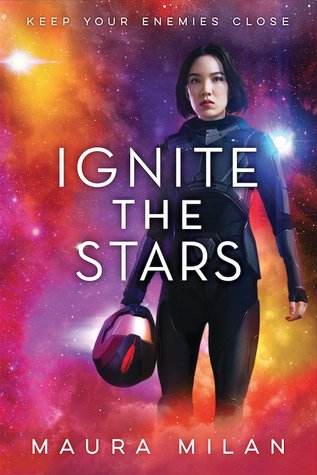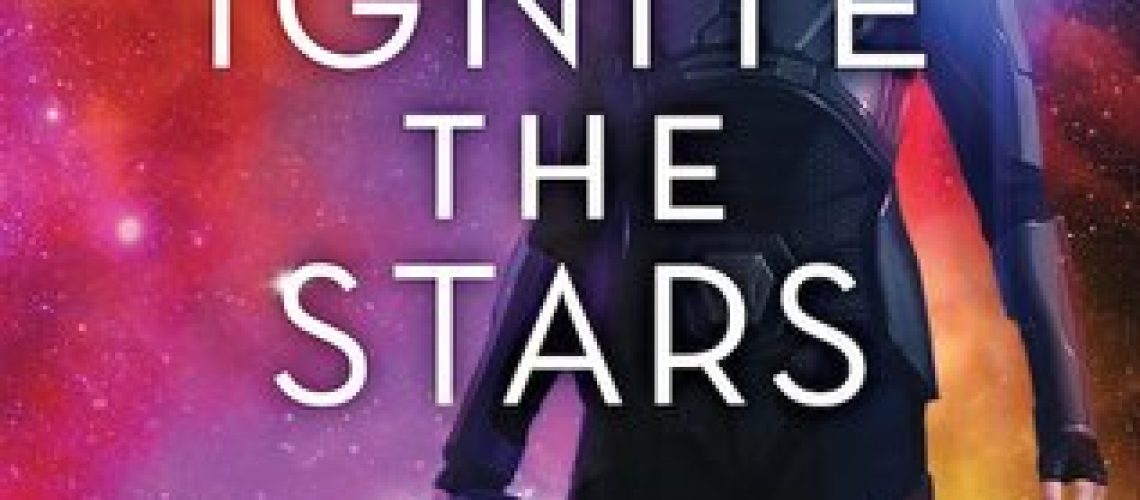Everyone has heard of Ia Cocha. The Rogue of the Fringe, The Sovereign of Dead Space, The Blood Wolf of the Skies; Ia goes by many names and is always a thorn in the side of the Olympus Commonwealth. The popular comic books paint Ia as a buff, white man. No one is expecting a scrappy Asian girl.
The Uranium War finished a bit over a year ago and Ia has been on the run. Unfortunately, the Commonwealth has finally caught up with her. Captured by General Adams, she is given a heart implant to keep her in line, then taken to Aphelion—the Commonwealth’s premier academy for the Royal Star Force. Ia might have been a thorn in the side of the Commonwealth, but no one can deny she has skills, and General Adams hopes to find a way to make use of them in his favour. Ia knows that’s never going to happen. She bides her time while she waits for her brother to rescue her, attending Aphelion’s classes and gathering as much information on the secret facility as she can.

Ia is a curious character. For the most part, she comes across as a Robin-Hood-type character: a rogue with a heart of gold fighting against the injustices of the establishment. Her crusade is justified, after all, since the Commonwealth had a hand in the destruction of her home system. And Ia has a strong compassionate streak. There are several times when we see her with a friend in crisis. She never pushes, but allows them to grieve or express their emotions in their own way, providing sympathy and a steady presence.
However, she’s also supposed to have a lot of blood on her hands. Some of this reputation has been exaggerated, and throughout the novel we are given examples of how the Commonwealth manipulates footage of her supposed atrocities into pieces of propaganda that serve their purposes. But some of this blood is also supposed to stick; Ia has no compunction about killing members of the RSF and her key story arc is about the way she comes to realise they are people, too. The problem is that we never see Ia at her worst—the deaths she is responsible for are distant and in the past, so they never quite seem convincing. Instead, it’s more like the story is trying to have its cake and eat it too.
That said, I rather enjoyed Ia as a character. When she first arrives at Aphelion, she’s hyperaware, counting cameras, looking for exits, sizing up her captors and taking note of anything that will assist her escape. She feels convincing as a warrior. And she makes a fierce friend.
Another thing I enjoyed about the book is the way Ia’s friendship with her roommate is given equal weight to the romance. In fact, the book is told in close third person, with chapters alternating between Ia, her roommate Brinn, and Ia’s warden and love interest Knives. Unsurprisingly, both friendship and romance involve enemies-to-friends/lovers arcs. The romance is pretty standard for the genre: two talented, prickly individuals form a grudging respect for each other’s skills and find themselves reluctantly attracted to each other.
The friendship is more interesting. Brinn is a Tawny, an alien race characterised by blue hair and high IQ. They’re a people not well regarded in the Commonwealth; the popular view is that it was their resistance to being annexed that started the Uranium War, leading to heavy casualties on both sides. Tawnus ultimately lost and many became refugees to the Commonwealth. Brinn is not one of them. Instead, as a native born to Nova Grae, she’s estranged from that part of her heritage. She dyes her hair and deliberately keeps her grades average in an effort to fly under the radar of bullies. However, Ia quickly clues into the situation, having long been a Tawny ally. She gradually helps Brinn embrace her heritage.
There’s an interesting secondary plot between Brinn and Angie, a bully from her old school who has also joined Aphelion. Angie has a particularly interesting arc, but with everything else going on, it doesn’t get the depth it deserves.
The plot is fairly predictable, but well-paced. There’s plenty of action, allowing us to see Ia at her best, showing her competence and coming up with creative solutions to the jams in which she finds herself. Nor are these scenes restricted to Ia; we also get to see Brinn and Knives show off their skills. These action sequences are interspersed with some nice moments of connection between the characters.
Unfortunately, I found the world building somewhat disappointing. This was particularly the case around the way the characters curse. Cursing in YA novels offers a tricky conundrum: on the one hand, swearing helps build authenticity around the way the characters speak, while on the other hand there’s the issue of conforming to adult ideas of what’s age appropriate. Amie Kaufman and Jay Kristoff dealt with this same problem very creatively in their series The Illuminae Files, allowing them to reveal a little more about a key character. Ignite the Stars deals with it via the substitution of words. According to Dictionary.com, “mung” is an existing (if uncommon) word for filth, making it a reasonable substitution. It also refers to a kind of bean used in some Asian cuisines and thus might have been a nice nod to Ia’s heritage. Unfortunately, there’s nothing else to support that interpretation, as the word is used not only by Ia but also by several characters of various backgrounds without any further Asian elements featured the predominant culture to support this. At least, not as far as I could tell—I acknowledge I’m far from the best person to judge that and may be missing aspects.
The other substitution involved the use of what seems to be a nonsense word, with characters exclaiming “What the mif?” and “Miffing hell!” This kind of nonsense substitution is a pet peeve of mine and niggled me throughout the story with its waste of opportunity.
There was one exception to my disappointment with the shallow world building. At one point a character exclaims “Why on Ancient Earth?”—by which we can infer the story is set in the distant future. However, other than the fact that heavy metal is now considered classic music (a detail which made me smile) and the random utilisation of mythic Greek place names, it has so far had little bearing on the story. I hope more of it might be unpacked in the sequel.
Overall, I found Ignite the Stars to be a fun, action-packed adventure, but one which could have dug a bit deeper.







